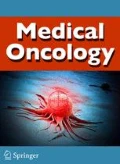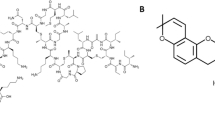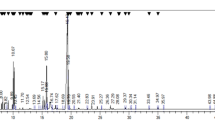Abstract
Colorectal cancer remains often refractory to classic therapies. In consequence, the search for new anti-tumor agents with minimal toxicity is of particular interest in colon cancer treatment. Prodigiosin as a secondary metabolite of Serratia marcescens induces apoptosis in various kinds of cancer cells with low toxicity on normal cells. In the present study, we evaluated the effect of prodigiosin on proliferation and expression of apoptotic-related genes in HT-29 cells. Malignant cells were treated to various concentrations of prodigiosin and proliferation rate, survivin, Bcl-2, Bax and Bad mRNA levels, caspase 3 activation and apoptosis were evaluated by different cellular and molecular techniques. Treatment of cells with increasing concentration of prodigiosin decreased significantly cell proliferation in a dose- and time-dependent manner. Following 48-h treatment, growth rate was measured to be 77 ± 6.8, 41.3 ± 3.1 and 46 ± 6.3 % for 100, 400 and 600 nM prodigiosin, respectively, compared to untreated cells. This molecule induced 61.7, 90 and 89 % decrease in survivin mRNA level as well as 1.9-, 2.8- and 2.2-fold increase in caspase 3 activation for indicated concentrations of prodigiosin, respectively. The level of Bcl-2 mRNA was inversely proportional to Bax and Bad mRNA levels. Low mRNA levels of Bcl-2 combined with high levels of Bax and Bad mRNAs were correlated to higher apoptosis rate in treated cells. Our data suggest that prodigiosin-induced apoptosis may ascribe to Bcl-2 and survivin inhibition in HT-29 cells and these genes may provide promising molecular targets of prodigiosin. Collectively, prodigiosin may have a great potential for colorectal cancer-directed therapy.





Similar content being viewed by others
References
Jemal A, Siegel R, Ward E, Hao Y, Xu J, Murray T, Thun MJ. Cancer statistics, 2008. CA Cancer J Clin. 2008;58:71–96.
Safaee A, Fatemi SR, Ashtari S, Vahedi M, Moghimi-Dehkordi B, Zali MR. Four years incidence rate of colorectal cancer in Iran: a survey of national cancer registry data-implications for screening. Asian Pac J Cancer Prev. 2012;13:2695–8.
Deorukhkar AA, Chander R, Ghosh SB, Sainis KB. Identification of a red-pigmented bacterium producing a potent anti-tumor N-alkylated prodigiosin as Serratia marcescens. Res Microbiol. 2007;158:399–404.
Sumathi C, MohanaPriya D, Swarnalatha S, Dinesh, GM, Sekaran G. Production of prodigiosin using tannery fleshing and evaluating its pharmacological effects. Sci World J. 2014;2014:1–8.
Francisco R, Pérez-Tomás R, Gimènez-Bonafé P, Soto-Cerrato V, Giménez-Xavier P, Ambrosio S. Mechanisms of prodigiosin cytotoxicity in human neuroblastoma cell lines. Eur J Pharmacol. 2007;572:111–9.
Ho TF, Peng YT, Chuang SM, Lin SC, Feng BL, Lu CH, Yu WJ, Chang JS, Chang CC. Prodigiosin down-regulates survivin to facilitate paclitaxel sensitization in human breast carcinoma cell lines. Toxicol Appl Pharm. 2009;235:253–60.
Sarela AI, Macadam RC, Farmery SM, Markham AF, Guillou PJ. Expression of the antiapoptosis gene, survivin, predicts death from recurrent colorectal carcinoma. Gut. 2000;46:645–50.
Violette S, Poulain L, Dussaulx E, Pepin D, Faussat AM, Chambaz J, Lacorte JM, Staedel C, Lesuffleur T. Resistance of colon cancer cells to long-terms 5-flourouracil exposure is correlated to the relative level of BCL-2 and BCL-XL in addition to BAX and P53 status. Int J Cancer. 2002;98:498–504.
Koehler BC, Scherr AL, Lorenz S, Urbanik T, Kautz N, Elssner C, Welte S, Bermejo JL, Jäger D, Schulze-Bergkamen H. Beyond cell death—antiapoptotic Bcl-2 proteins regulate migration and invasion of colorectal cancer cells in vitro. PLoS One. 2013;8:1–12.
Srobel T, Swanson L, Korsmeyer S, Cannistra SA. BAX enhances paclitaxel-induced apoptosis trough a p53-independent pathway. Proc Natl Acad Sci. 1996;93:14094–9.
Lee JW, Soung YH, Kim SY. Inactivating mutations of proapoptotic Bad gene in human colon cancers. Carcinogenesis. 2004;25:1371–6.
Montaner B, Navarro S, Piqué M, Vilaseca M, Martinell M, Giralt E, Gil J, Pérez-Tomás R. Prodigiosin from the supernatant of Serratia marcescens induces apoptosis in hematopoietic cancer cell lines. Br J Pharmacol. 2000;131:585–93.
Montaner B, Perez-Tomas R. Prodigiosin-induced apoptosis in human colon cancer cells. Life Sci. 2001;68:2025–36.
Díaz-Ruiz C, Montaner B, Pérez-Tomás R. Prodigiosin induces cell death and morphological changes indicative of apoptosis in gastric cancer cell line HGT-1. Histol Histopathol. 2001;16:415–21.
Pocard M, Chevillard S, Villaudy J, Poupon MF, Dutrillaux B, Remvikos Y. Different p53 mutations produce distinct effects on the ability of colon carcinoma cells to become blocked at the G1/S boundary after irradiation. Oncogene. 1996;12:875–82.
Royds JA, Iacopetta B. p53 and disease: when the guardian angel fails. Cell Death Differ. 2006;13:1017–26.
Altieri DC. Validating survivin as a cancer therapeutic target. Nat Rev Cancer. 2003;3:46–54.
Li F, Ling X. Survivin study: an update of “what is the next wave”? J Cell Physiol. 2006;208:476–86.
Pennati M, Folini M, Zaffaroni N. Targeting survivin in cancer therapy: fulfilled promises and open questions. Carcinogenesis. 2007;28:1133–9.
Yamamoto H, Ngan CY, Monden M. Cancer cells survive with survivin. Cancer Sci. 2008;99:1709–14.
De Angelis PM, Stokke T, Thorstensen L, Lothe RA, Clausen OP. Apoptosis and expression of bax, bcl-x, and bcl-2 apoptotic regulatory proteins in colorectal carcinomas and association with p53 genotype/phenotype. Mol Pathol. 1998;51:254–61.
Maurer CA, Friess H, Bühler SS, Wahl BR, Graber H, Zimmermann A, Büchler MW. Apoptosis inhibiting factor Bcl-xL might be the crucial member of the Bcl-2 gene family in colorectal cancer. Dig Dis Sci. 1998;43:2641–8.
Willis SN, Fletcher JI, Kaufmann T, van Delft MF, Chen L, Czabotar PE, Ierino H, Lee EF, Fairlie WD, Bouillet P, Strasser A, Kluck RM, Adams JM, Huang DC. Apoptosis is initiated when BH3 ligands engage multiple Bcl-2 homologs not Bax or Bak. Science. 2007;315:856–9.
Cory S, Adams JM. The Bcl2 family: regulators of the cellular life-or-death switch. Nat Rev Cancer. 2002;2:647–56.
Sinicrope FA, Rego RL, Foster NR, Thibodeau SN, Alberts SR, Windschitl HE, Sargent DJ. Proapoptotic Bad and Bid protein expression predict survival in stages II and III colon cancers. Clin Cancer Res. 2008;14:4128–33.
Acknowledgments
The authors herein express their great appreciation for the financial support received from Iran National Science Foundation (INSF).
Conflict of interest
The authors declare no conflict of interest.
Author information
Authors and Affiliations
Corresponding author
Rights and permissions
About this article
Cite this article
Hassankhani, R., Sam, M.R., Esmaeilou, M. et al. Prodigiosin isolated from cell wall of Serratia marcescens alters expression of apoptosis-related genes and increases apoptosis in colorectal cancer cells. Med Oncol 32, 366 (2015). https://doi.org/10.1007/s12032-014-0366-0
Received:
Accepted:
Published:
DOI: https://doi.org/10.1007/s12032-014-0366-0




